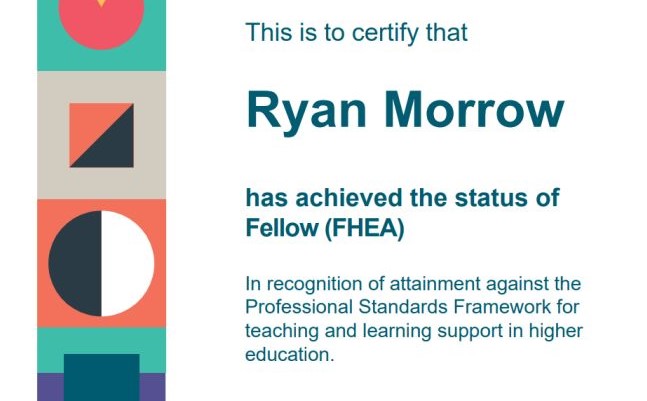I’m thrilled to share that I’ve achieved the prestigious Fellow of the Higher Education Academy (FHEA) accreditation from Advance HE! This milestone reflects my commitment to excellence in teaching and learning, especially from a technical perspective.
For technical staff in universities, gaining the FHEA accreditation is a testament to our dedication to enhancing the educational experience. It recognizes our ability to integrate technical expertise with pedagogical skills, ensuring that students receive a well-rounded and impactful education. This accreditation not only highlights our professional development but also enhances our credibility and career prospects within the academic community.
Advance HE (formerly known as the Higher Education Academy: HEA) aims to enhance the quality of the student learning experience, and it has made significant strides in this area through professional recognition, such as the Fellowship of Advance HE. This fellowship is widely acknowledged as a ‘quality benchmark’ for teaching and supporting student learning in higher education, requiring applicants to demonstrate their effectiveness within the UK Professional Standards Framework (UKPSF).
Achieving FHEA accreditation offers numerous benefits:
- Professional Recognition: It formally acknowledges my expertise and commitment to teaching and learning.
- Career Advancement: It is often considered essential for appointments and promotions in higher education.
- Personal Development: The reflective process helps improve teaching methods.
- Networking Opportunities: It opens doors for collaboration and professional networking.
- International Recognition: Valued by institutions worldwide, beneficial for global career opportunities.
- Post-nominal Letters: I can use “FHEA” after my name, signifying my accredited status.
The Centre for the Study of Higher Education at the University of Kent offers an excellent support programme for experienced staff seeking recognition. The Route to Recognition for Experienced Staff (RRES) is intended for experienced staff (academic, support, technical) with at least three years of experience of leading, teaching and/or supporting learning in higher education. Colleagues are eligible for the scheme if they are not required to complete the PGCHE. It is designed to help staff members reflect on their teaching practices, gather evidence of their impact, and prepare a strong application for accreditation. This structured support ensures that we are well-prepared and confident in our pursuit of professional recognition.
The journey towards FHEA accreditation has been incredibly rewarding on a personal level. It provided an opportunity to reflect deeply on my own practices and skills, allowing me to think critically about why and how things are done in the classroom. This introspection has not only enhanced my teaching methods but also reinforced my commitment to providing the best possible learning experience for my students.
For many technical staff, recognition like this can seem unobtainable, as we are not “teachers” or educators in the traditional sense. However, this achievement demonstrates that excellence in teaching and learning is not confined to conventional roles. It’s crucial to address the misconception that the fellowship is only relevant to academic or lecturing staff. This misunderstanding may arise from a lack of visibility or recognition of the vital role that technical and professional support staff play in delivering quality student learning. The Fellowship of Advance HE is open to all staff who make significant contributions to the student learning experience, including technical and professional support staff. It highlights the valuable contributions that technical staff make to the educational environment and shows that with the right support and dedication, such recognition is within reach. Simple tasks such as ensuring health and safety compliance in labs and workshops, which is crucial for creating a safe learning environment, Developing comprehensive written guides and manuals that help students understand complex technical processes, and providing personalised assistance to students, helping them overcome specific challenges and enhancing their learning experience, are all areas where technical staff make a significant impact. These contributions are just as important to pedagogy and excellent student support as traditional teaching roles
This achievement would not have been possible without the incredible support from my colleagues and mentors at the University of Kent. Special thanks go to John Crook, Julia Hope, and Gianluca Marcelli for their invaluable guidance and encouragement throughout the process. Their support has been instrumental in navigating the journey towards this accreditation.


